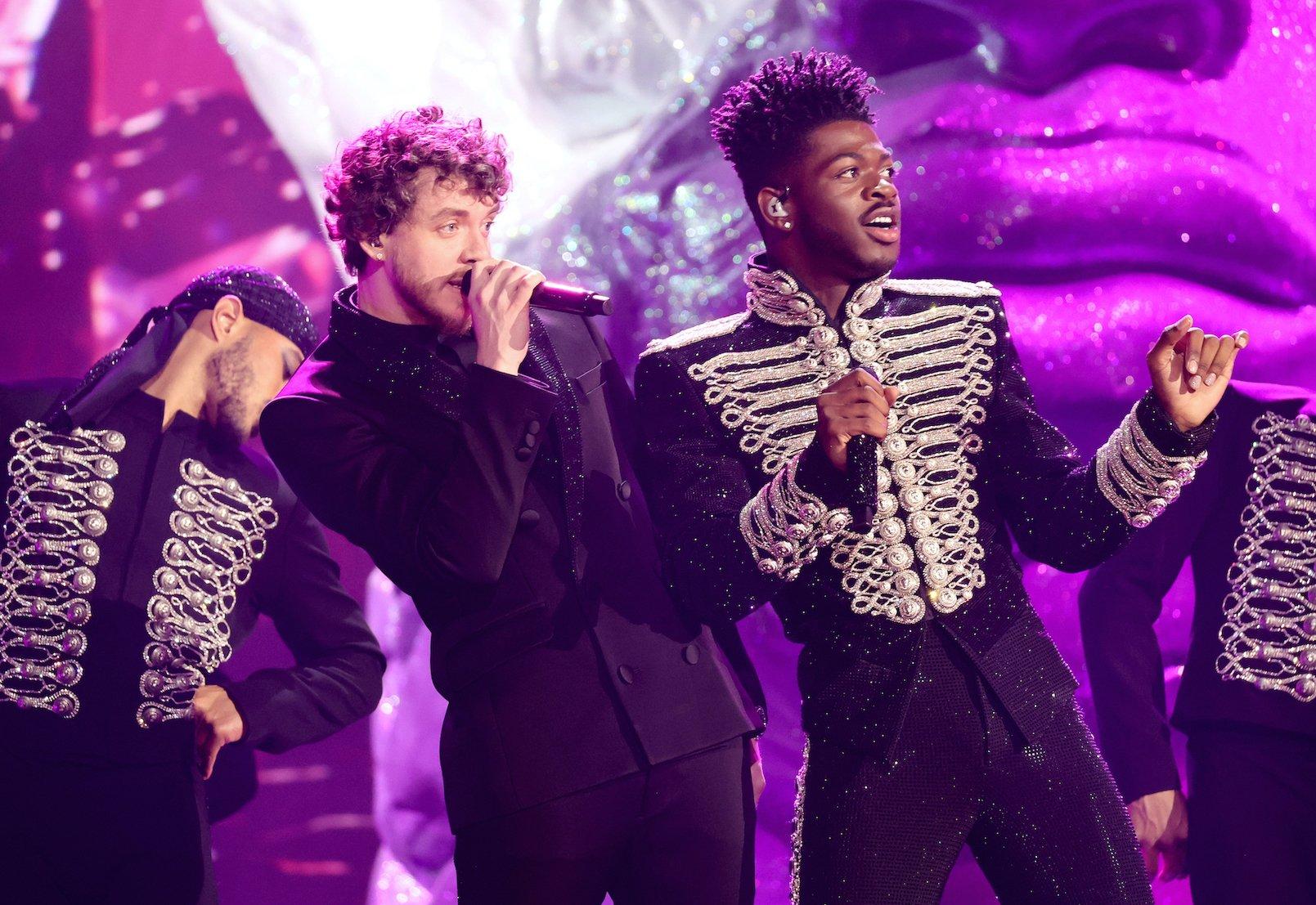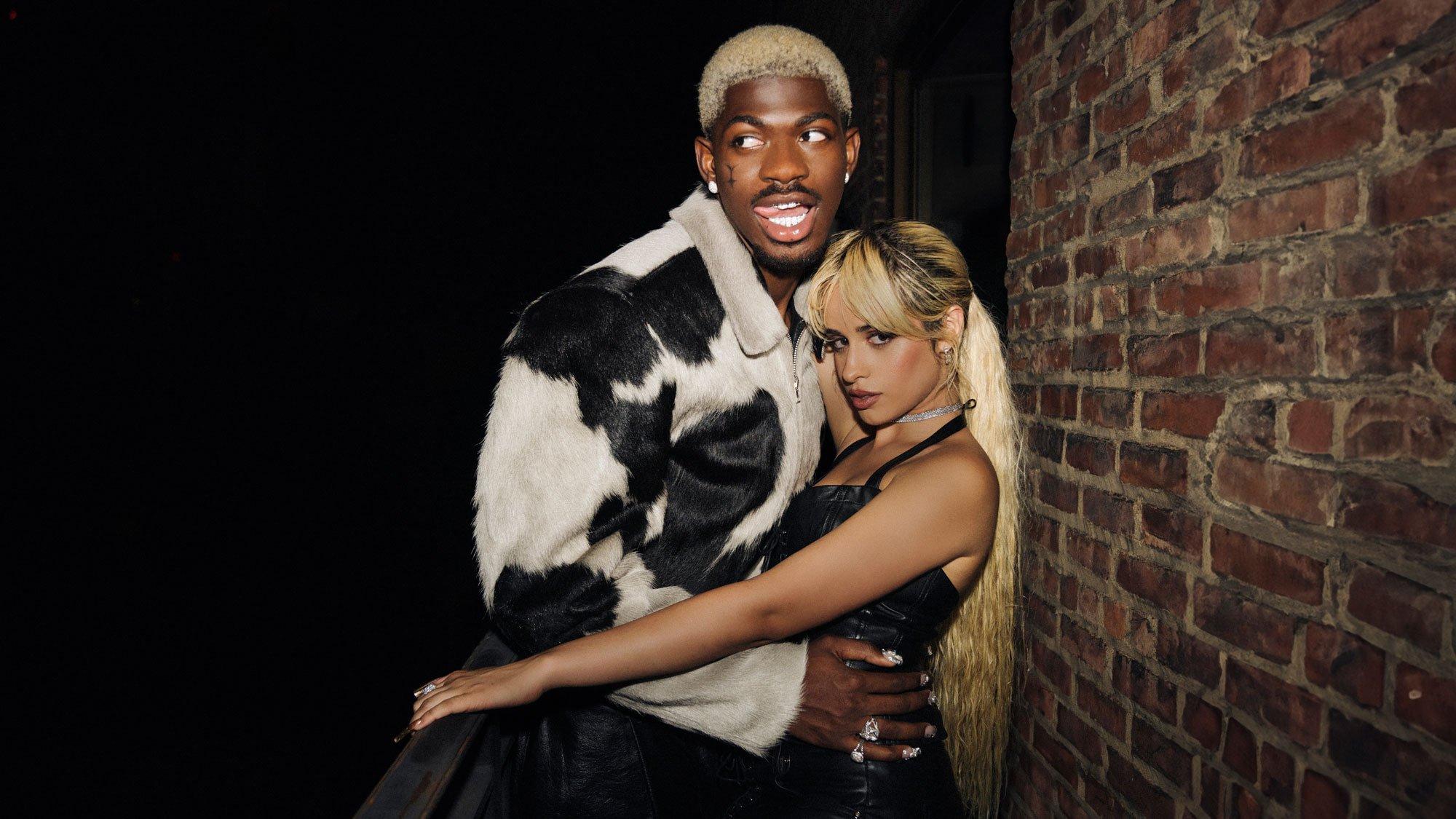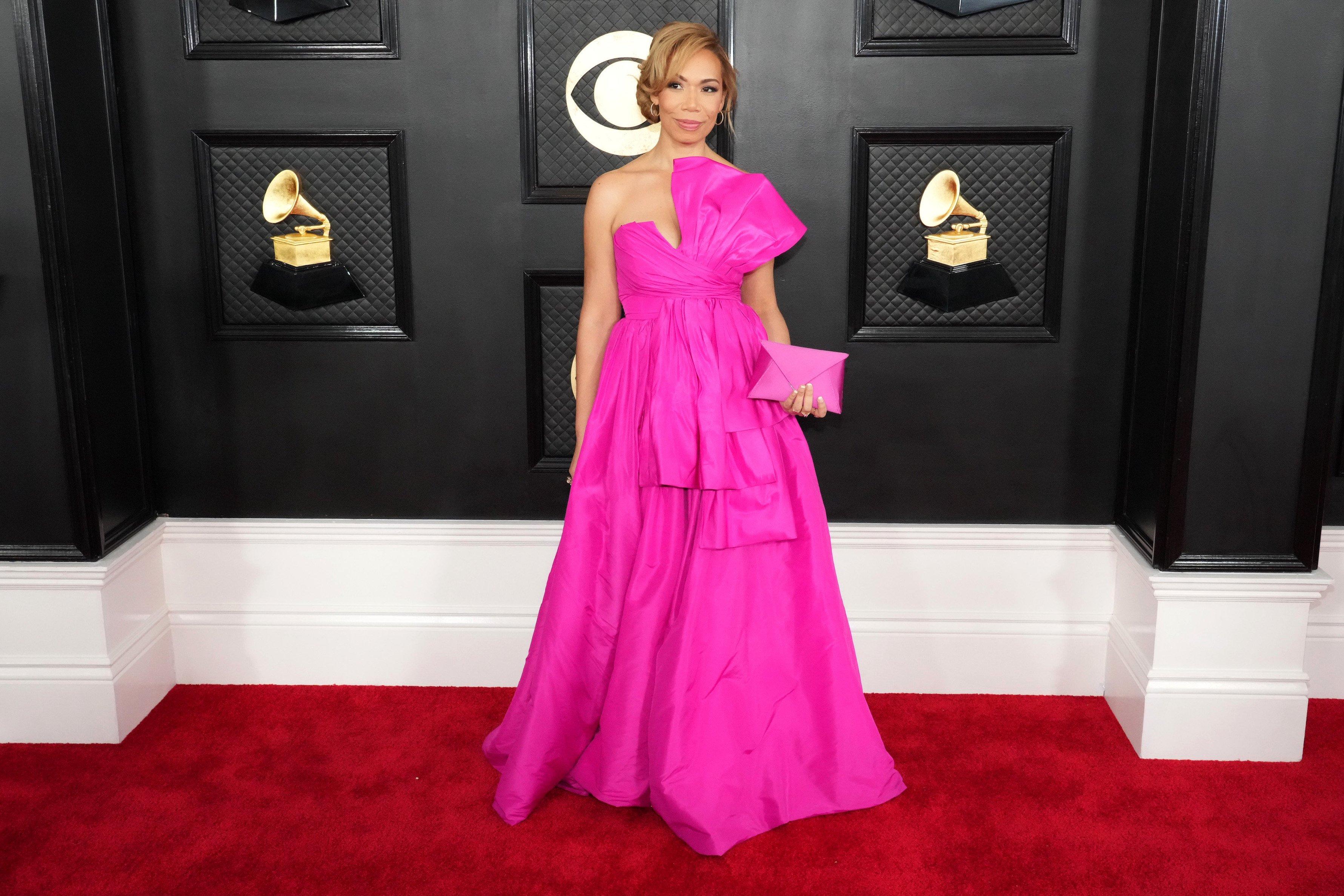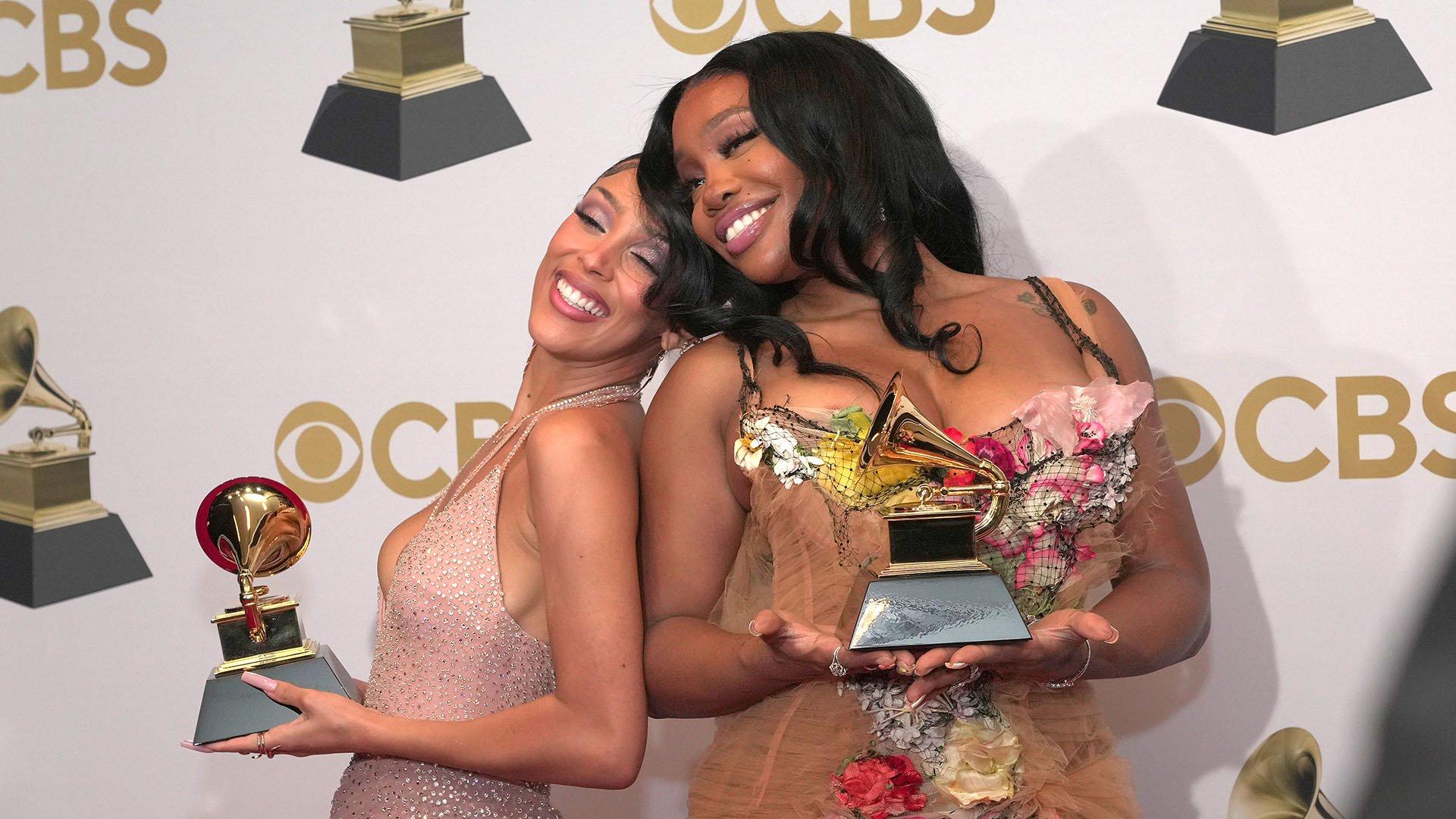Photo: Emma McIntyre/Getty Images for The Recording Academy

news
Watch Lil Nas X & Jack Harlow Give A Show-Stopping Performance Of "Industry Baby" | 2022 GRAMMYs
Lil Nas' medley at the 64th GRAMMY Awards also included "Dead Right Now" and "MONTERO (Call Me By Your Name)"
Lil Nas X had everyone on their feet for his exhilarating medley at the 2022 GRAMMYs, which included MONTERO album highlights "Dead Right Now," "Industry Baby" and "Montero (Call Me By Your Name)."
"Dead Right Now" served as the cinematic opener, as Lil Nas X performed alongside a massive backing choir and drummers. The two-time GRAMMY winner quickly dove into "Montero (Call Me By Your Name)," giving a wink to the single's nationwide controversy with news coverage clips and tweets plastered onto the screen.
Lil Nas X amped up the energy with the addition of "Industry Baby," his hit collaboration with fellow rapper Jack Harlow. Seemingly paying homage to Michael Jackson's iconic fashion during 1995's HIStory: Past, Present and Future, Book I era and Janet Jackson's "Rhythm Nation" video, Lil Nas and his dancers showcased militant choreography.
Harlow was the perfect performance topper, entering the stage with his infectious swagger and cheeky guest verse. The near-tangible energy reflected Lil Nas X's massive past year, as "MONTERO (Call Me By Your Name)" and "Industry Baby" became his respective second and third Billboard Hot 100 No. 1 hits following 2019's "Old Town Road."
Lil Nas X earned five nominations at the 64th GRAMMYs ceremony. "MONTERO (Call Me By Your Name)" scored nods for Record Of The Year, Song Of The Year and Best Music Video, while the rapper also received nods for Album Of The Year (MONTERO) and Best Melodic Rap Performance ("Industry Baby").
Check out the complete list of winners and nominees at the 2022 GRAMMYs.

Photo: The Chosunilbo JNS/Imazins via Getty Images
list
New Music Friday: Listen To New Songs From LISA From Blackpink, Lil Nas X, Kelsea Ballerini, MC Lyte & More
Hot summer days require even hotter tunes. Here are some fresh-out-the-oven songs and albums by Hiatus Kaiyote, Lucky Daye, Headie One, Kaitlin Butts, and more.
We’ve been feeling the heat for a minute now, but summer is finally, officially, upon us.
What do you have on deck to soundtrack it? Perhaps you’re checking out Camila Cabello’s fourth offering, C,XOXO. Or Jxdn’s expectations-bucking new album, When the Music Stops. And there are so many other worthy candidates for your playlist — from Lupe Fiasco’s Samurai to Omar Apollo’s God Said No.
No matter where your stylistic compass points, this Friday release day has got something for you. As you gather your sunscreen and shades, let’s breeze through a cross-section of what’s out there.
LISA — "Rockstar"
K-pop loves its solo releases, showcasing how the various members of a group can shine individually while combining with ecstatic chemistry. Enter LISA, one-fourth of Korean titans BLACKPINK, who's already turned heads with her 2021 debut album, Lalisa.
"Rockstar" is another swing outside her main gig, featuring serrated chiptune production and LISA's commanding rap flow. The gritty, urban, futuristic video is a visual treat, and the chorus's boast of "Lisa, can you teach me Japanese?" is a multilingual flex — as well as a maddeningly unshakeable earworm.
Kelsea Ballerini & Noah Kahan — "Cowboys Cry Too"
The "Peter Pan" heavyweight and four-time GRAMMY nominee Kelsea Ballerini has called 2024 "a new chapter of music." Her collaboration with folk/pop singer/songwriter Noah Kahan, "Cowboys Cry Too," is the tip of the spear.
More than a month after the pair performed together at the 2024 Academy of Country Music Awards, their first recorded team-up is an aching, yearning ballad about breaking down a gruff exterior and revealing true emotions.
"Cowboys cry too/ They may not let 'em fall down in their hometown thinkin' they still got s*** to prove," Ballerini sings in the chorus. "That well runs deep/ But when he's showin' his skin, lettin' mе in, that's when he's toughest to mе."
Lil Nas X — "Here We Go!" (from the Netflix film 'Beverly Hills Cop: Axel F')
"So excited to release the best song of all time this friday!," Lil Nas X proclaimed on Instagram. (And on a Beverly Hills Cop soundtrack, no less!)
"Here We Go!" comes at an inflection point for the "J Christ" singer: "sorry I've been so scared with my art lately," he added in the same post. "I'm coming around to myself again. I will make you guys very proud."
This pro forma banger certainly inspires pride: tenacious lines like "I'm livin' and livin' I wanna die/ They tryna get even/ I'm beatin' the odds" will get under your skin. As for Beverly Hill Cop: Axel F, the Eddie Murphy joint will whiz to your screen July 3 via Netflix.
Lucky Daye — 'Algorithm'
Lucky Daye picked up a win for Best Progressive Album at the 2022 GRAMMYs, for Table for Two. After a slew of nominations for work with Beyoncé and Mary J. Blige, he's investigating the Algorithm.
The single "HERicane" was just a teaser, with songs like "Blame," featuring Teddy Swims; "Paralyzed," featuring RAYE;" and "Diamonds in Teal" expanding on and honing his soul-funk-R&B vision.
"Don't know pickin' sides/ 'Cause I'm rollin' in desire," he dreamily sings in the gently roiling "Diamonds in Teal." "I don't know which lie's true/ Or maybe I do, or maybe I'm you." It's a suitable mission statement wrapped in a stealthily seductive package.
Hiatus Kaiyote — 'Love Heart Cheat Code'
A jazzy, soulful, psychedelic band of Aussies, Hiatus Kaiyote has been wowing audiences for more than a decade. Whether through sampling or features, they've crossed paths with Drake, Anderson .Paak, and Beyoncé and Jay-Z.
Love Heart Cheat Code builds brilliantly on their last three albums: their 2012 debut Tawk Tomahawk, 2015's Choose Your Weapon, and 2021's Mood Valiant. Tracks like "Telescope," "Everything's Beautiful," and "Make Friends" are burbling brooks of atmosphere, groove and vibe.
Boulevards — 'Carolina Funk: Barn Burner on Tobacco Road'
Any fans of deep, pungent funk grooves should investigate Boulevards immediately. The project of mastermind Jamil Rashad, their new album Carolina Funk: Barn Burner on Tobacco Road tips its hat to yesterday's funk with a contemporary twist, bringing a refreshing spin on the well-trod template of syncopated basslines and stabbing horns.
Across highlights like "Do It Like a Maniac Part 1&2" and "Run & Move," Boulevards shows — once again — that few can nail this gritty sound quite like Rashad and crew.
Headie One — 'The Last One'
British drill-inflected MC Headie One first made a splash overseas with his 2023 debut album, Strength to Strength. Less than a year later, he's returning with The Last One.
Back in 2022, he hinted at the existence of his sophomore album in his non-album track "50s" — "The fans calling for 'Martin's Sofa'/ It might be the first single from my second," he rapped.
Helmed by that single, The Last One features Potter Payper, Stormzy, Fridayy, Skrillex, and more. The album is a leap forward in terms of production, scale and exploration.
Katlin Butts — 'Roadrunner!'
Any theater kid worth their salt knows at least a few bars from the musical "Oklahoma!"; country sensation Kaitlyn Butts has just unfolded it into an entire album.
"It's a love story but there's also a murder and a little bit of an acid-trippy feel to it at times; it's set in the same place where I come from," she said in a statement, noting she saw "Oklahoma!" with her parents every summer during childhood. "Once I got the idea for this album," she continued, "I couldn't believe I hadn't thought of it before, and it turned into something that completely encompasses who I am and what I love."
A laugh riot as well as a colorful, openhearted statement, Roadrunner! does the old Rodgers and Hammerstein chestnut good.
Read more: 5 Female Artists Creating The Future Of Country Music: Jaime Wyatt, Miko Marks & More
Amaarae — 'roses are red, tears are blue — Fountain Baby Extended Play'
Futurist Afropopper Amaarae made a gigantic splash with her second album, 2023's Fountain Baby — even Pitchfork gave it their coveted Best New Music designation.
That lush, enveloping album just got an expansion pack: roses are red, tears are blue — A Fountain Baby Extended Play is a continuation of its predecessor with six new songs. The oceanic "wanted," featuring Naomi Sharon, is a highlight, as is a remix of "Disguise" with 6LACK.
"Ooh, I'll be wanted/ I've been wanted," a pitch-shifted Sharon sings near the end, as if turning over the phrase. "Wanted" is one way to describe Amaraae's position in the music landscape.
Learn more: Meet The Latest Wave Of Rising Afrobeats Stars: AMAARAE, BNXN, Oladapo & More
MC Lyte — "King King" (feat. Queen Latifah)
The 50th anniversary of hip-hop may have come and gone, but hip-hop is forever. Today, legendary hip-hop pioneers MC Lyte and Queen Latifah continue to bear the flame of the genre as an elevating force with "King King," a conscious, uplifting offering.
"This is dedicated to all the kings and all the soon to be kings/ We're counting on you/ We love you/ This is for you, you and you and you," MC Lyte begins, while Latifah holds it down on the chorus with "This your crown hold it/ Even if it all falls down show it/ You know the world is watching now I know you get tired from keepin' it all together/ We need you."
During Women's History Month in March, MC Lyte released "Woman," the first single from her upcoming album, featuring hip-hop icons Salt (of Salt 'N Pepa), Big Daddy Kane, and R&B singer Raheem DeVaughn. MC Lyte's first new album in nearly a decade drops this summer; keep your eyes and ears peeled.
Learn more: 9 Teen Girls Who Built Hip-Hop: Roxanne Shante, J.J. Fadd, Angie Martinez & More
Latest News & Exclusive Videos

2024 Paris Olympics Opening Ceremony: Watch Celine Dion, Lady Gaga, Gojira & More Perform

Ice Spice Is The Drill Queen On 'Y2K!': 5 Takeaways From Her Debut Album

New Music Friday: Listen To New Songs From Halsey, MGK And Jelly Roll, XG & More

Watch Young MC Win Best Rap Performance In 1990

The Red Clay Strays Offer A New Kind Of Religion With 'Made By These Moments'

Photo: Courtesy Camila Cabello & Lil Nas X
list
New Music Friday: Listen to Songs From Megan Thee Stallion, Camila Cabello & Lil Nas X, BTS' RM & More
May 10 is quite the stacked day of new music across all genres — from Post Malone & Morgan Wallen's country collab, to Stray Kids' team-up with Charlie Puth, to The Chainsmokers and Kings of Leon. Check out some fresh releases to enjoy this weekend here.
As the summer quickly approaches, artists from every genre continue to unveil new music for warmer weather. Friday May 10 is particularly packed with anticipated and surprise releases from both emerging talents and established names.
The new albums alone prove just that: pop songsmith Alec Benjamin's 12 Notes, folk-rock band Judah & the Lion's The Process, regional Mexican stars Grupo Frontera's Jugando a Que No Pasa Nada, and GRAMMY-winning R&B singer Andra Day's Cassandra, to name a few.
Meanwhile, a big, cool glass of major rap releases is here to help wash down the piping hot Kendrick and Drake beef served up over the last week. Full album releases debuted from Gunna, Chief Keef, and Ghostface Killah — the latter featuring guest spots from Nas, Kanye West, Raekwon, Method Man and more. Hottie Megan Thee Stallion's powerful new single, "BOA", sets the stage for her Hot Girl Summer tour which officially starts on May 14. New songs from Ice Spice, Kodak Black, NLE Choppa, Coi Leray, G-Eazy, Yung Gravy, Ski Mask the Slump God set the playlist for a weekend full of slappers.
There's tons of collaborations, too, including the much-teased pairing of Post Malone and Morgan Wallen with "I Had Some Help," a track that showcases Malone's furtherance into country in a catchy, reflective anthem. But country music lovers also have more to enjoy this weekend: Orville Peck's duets project, Stampede Vol.1, features the likes of Willie Nelson and Elton John," while Scotty McCreery's Rise & Fall and Avery Anna's single "Blonde" fill the fuel tank for a rodeo-ready summer.
BTS's RM delivers another solo track "Come Back to Me" and Stray Kids dropped a new collaboration with Charlie Puth, coming fresh off the K-pop group's appearance at the Met Gala earlier this week. And the electronic and rock scenes are not left behind, with A.G. Cook exploring a new twist on Britpop and Sebastian Bach's release of Child Within The Man.
Dive into today's releases from Megan Thee Stallion, The Chainsmokers, RM, Stray Kids with Charlie Puth, Camila Cabello with Lil Nas X, Post Malone and Morgan Wallen below.
Megan Thee Stallion, "BOA"
Megan Thee Stallion's new single "BOA" continues to play up the themes of empowerment and self-realization that define her current musical phase and comes just days ahead of her Hot Girl Summer Tour starting on May 14. The song's cover art features Megan with a striking snake, a recurring symbol of rebirth that has been significant in her recent work, appearing in tracks like the Billboard Hot 100 hit "Hiss" and the 2023 song "Cobra."
"BOA" is a continuation of Megan's snake-themed narrative, but serves as a saccharine homage to her favorite late-'90s and early 2000s anime and video game classics. The music video features references to Scott Pilgrim, One Piece, Dance Dance Revolution, and iconic 3D fighting games like Mortal Kombat, complete with visuals and Gantz-inspired outfits.
Speaking to Women's Health about her upcoming summer album, Megan discussed the personal growth and renewal she has experienced, inspiring this new era of music. "I was inspired to create this album about rebirth because I feel I am becoming a new person physically and mentally," she shared.
Camila Cabello & Lil Nas X, "HE KNOWS"
Camila Cabello teams up with Lil Nas X for the tantalizing new song "He Knows," delivering a radio-friendly track that's as catchy as it is lustful. The new music mirrors the infectious energy of their recent appearance at FKA Twigs' Met Gala afterparty, where they both were seen dancing the night away behind the DJ booth.
"He Knows" serves as a precursor to Cabello's highly anticipated fourth solo album, C,XOXO, — set to drop on June 28 — and teases a glimpse of Cabello's evolving artistic direction. The single follows on the heels of her recent hit "I LUV IT" featuring Playboi Carti, part of the reimagining of her sound and artistic brand.
RM, "Come Back To Me"
BTS member RM has released a new single, "Come Back To Me," accompanied by a music video. The relaxed track gives fans a taste of his upcoming second solo album, Right Place, Wrong Person, set to release on May 24.
In the song, RM explores themes of right and wrong, capturing the complex emotions of wanting to explore new avenues while wishing to stay comfortable in the present. "Come Back To Me" features contributions from OHHYUK of the South Korean band HYUKOH, and Kuo of the Taiwanese band Sunset Rollercoaster. Additional credits include JNKYRD and San Yawn from Balming Tiger. RM first performed "Come Back To Me" during a surprise appearance at BTS bandmate Suga's concert in Seoul last summer, noting it as a favorite from his forthcoming album.
The music video for "Come Back To Me" was written, directed, and produced by Lee Sung Jin, known for his work on the Netflix show "Beef." The video features actress Kim Minha from the Apple TV+ series "Pachinko" and faces themes of identity and self-reflection, showing RM confronting different versions of himself. Its cast includes notable Korean and American actors such as Joseph Lee, Lee Sukhyeong, and Kim A Hyun.
Post Malone & Morgan Wallen, "I Had Some Help"
Post Malone and Morgan Wallen blend their distinct musical styles in the much-anticipated release of their collaborative single "I Had Some Help." Merging Malone's versatile pop sensibilities while leaning into his country roots with Wallen's, well, help, the duet is a unique crossover that has had fans clamoring to hear more since the two first teased the song earlier this year.
Finally premiering during Wallen's headlining performance at Stagecoach Festival on April 28, the uptempo song explores themes of mutual support and shared experiences, encapsulated by the lyric, "It ain't like I can make this kind of mess all by myself."
The collaboration has sparked significant buzz and showcases the duo's chemistry and shared knack for storytelling. This single highlights their individual talents as well as their ability to bridge genre divides, already promising to be a hit on the charts and a favorite among fans.
The Chainsmokers, No Hard Feelings
Maestros of mainstream emotion, The Chainsmokers continue to master the art of turning personal reflections into global anthems with their latest EP, No Hard Feelings. The six-song project see Alex Pall and Drew Taggart exploring the emotional highs and lows of modern relationships, weaving their signature dance beats with pop sensibilities as they have since 2015's "Roses."
The duo's latest release serves as a soundtrack to both sun-kissed days and introspective nights. The collection includes the single "Friday," a collaboration with Haitian-American singer Fridayy, described by the duo as a direct descendant of "Roses." Other tracks, such as "Addicted," also underscore the Chainsmokers' knack for capturing the zeitgeist of contemporary love and loss.
Kings of Leon, Can We Please Have Fun
Kings of Leon return with their signature blend of rock and introspection on their ninth studio album, Can We Please Have Fun. The LP finds the band infusing their established sound with fresh, unbridled energy, reminiscent of their early days yet matured by years of experience. The album features standout tracks like "Mustang" and "Nothing To Do," which mix playful lyrics with serious musical chops, showcasing Kings of Leon's unique ability to combine rock's raw power with catchy, thoughtful songwriting.
The band is set to bring Can We Please Have Fun to life on their 2024 world tour, starting in Leeds, United Kingdom on June 20 and wrapping in Bridgeport, Connecticut, on Oct. 5. Fans can expect a high-energy series of performances that blend new tracks with beloved classics, all delivered with the Kings of Leon's legendary fervor.
Stray Kids & Charlie Puth, "Lose My Breath"
Stray Kids have teamed up with Charlie Puth for their latest release, "Lose My Breath," a track that blends K-pop dynamism with Western pop flair, written by Stray Kids' own producer team 3racha (Bang Chan, Changbin, and Han) along with Puth. The TK song details a whirlwind of emotions, describing symptoms of breathlessness and heart-palpitating moments encapsulated in the lyrics: "I lose my breath when you're walking in/ 'Cause when our eyes lock, it's like my heart stops."
"Lose My Breath" is described as a "warm-up" for Stray Kids' forthcoming album, set for release this summer. The track further highlights the global appeal of Stray Kids ahead of their highly anticipated headlining set at Lollapalooza in August. It also continues Puth's engagement with K-pop, following his previous work with other K-pop acts including his collab with BTS' Jungkook, "Left and Right," and "Like That," a song he co-wrote for K-pop girl group BABYMONSTER.
15 Must-Hear Albums In May 2024: Dua Lipa, Billie Eilish, Sia, Zayn & More

Photo: Jeff Kravitz/FilmMagic
video
Where Do You Keep Your GRAMMY?: Autumn Rowe Revisits Her Unexpected Album Of The Year Win With Jon Batiste
Acclaimed songwriter Autumn Rowe reveals the inspirational location where her Album Of The Year golden gramophone resides, and details the "really funny way" she first met Jon Batiste.
Ever since Autumn Rowe won a GRAMMY in 2022, it's been her biggest motivation. That's why the musical multi-hyphenate keeps the award nestled in her writing room — to keep her creative juices flowing.
"It reminds me that anything is possible," she says in the latest episode of Where Do You Keep Your GRAMMY?
Rowe won her first-ever career GRAMMY in 2022 with an Album Of The Year award for Jon Batiste's We Are. "It was very stressful," she recalls with a laugh.
"Right before they announced Album Of The Year, the pressure started getting to me," Rowe explains. "Album Of The Year is the biggest possible award you can win. So, I'm like, 'We didn't win any of these [categories], how are we going to win the biggest award?"
The win also taught her one unforgettable, valuable lesson: "We matter. The music matters. Everything matters. We just have to create it. If there isn't space for it, we have to make space for it. Don't wait for something to open."
Rowe says she grew up "super dirt poor" and never even had the opportunity to watch the awards ceremony on television. "To be a GRAMMY winner means it is possible for everyone," she declares.
Press play on the video above to learn more about the backstory of Autumn Rowe's Album Of The Year award, and remember to check back to GRAMMY.com for more new episodes of Where Do You Keep Your GRAMMY?

Photo: Kevin Mazur/Getty Images for The Recording Academy
video
GRAMMY Rewind: Watch Doja Cat & SZA Tearfully Accept Their First GRAMMYs For "Kiss Me More"
Relive the moment the pair's hit "Kiss Me More" took home Best Pop Duo/Group Performance, which marked the first GRAMMY win of their careers.
As Doja Cat put it herself, the 2022 GRAMMYs were a "big deal" for her and SZA.
Doja Cat walked in with eight nominations, while SZA entered the ceremony with five. Three of those respective nods were for their 2021 smash "Kiss Me More," which ultimately helped the superstars win their first GRAMMYs.
In this episode of GRAMMY Rewind, revisit the night SZA and Doja Cat accepted the golden gramophone for Best Pop Duo/Group Performance — a milestone moment that Doja Cat almost missed.
"Listen. I have never taken such a fast piss in my whole life," Doja Cat quipped after beelining to the stage. "Thank you to everybody — my family, my team. I wouldn't be here without you, and I wouldn't be here without my fans."
Before passing the mic to SZA, Doja also gave a message of appreciation to the "Kill Bill" singer: "You are everything to me. You are incredible. You are the epitome of talent. You're a lyricist. You're everything."
SZA began listing her praises for her mother, God, her supporters, and, of course, Doja Cat. "I love you! Thank you, Doja. I'm glad you made it back in time!" she teased.
"I like to downplay a lot of s— but this is a big deal," Doja tearfully concluded. "Thank you, everybody."
Press play on the video above to hear Doja Cat and SZA's complete acceptance speech for Best Pop Duo/Group Performance at the 2022 GRAMMY Awards, and check back to GRAMMY.com for more new episodes of GRAMMY Rewind.
How 'SOS' Transformed SZA Into A Superstar & Solidified Her As The Vulnerability Queen
